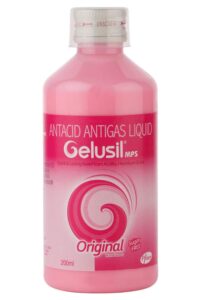A common antacid used to treat acidity, indigestion, and heartburn symptoms is Gelusil syrup. There are several different dosages of Gelusil, including pills, chewable tablets, and syrup. We will talk about the usage, dosage, side effects, and other pertinent facts concerning Gelusil syrup in this post.
Gelusil Mps – 200 ml (Mint, Pack of 3). Buy Now
What is Gelusil Syrup?
In the antacid medicine Gelusil syrup, simethicone, aluminium hydroxide, and magnesium hydroxide are combined. By neutralising excess stomach acid and lowering gas production in the stomach, the active components in Gelusil syrup quickly relieve the symptoms of heartburn, indigestion, and acidity.
There are several varieties of Gelusil syrup, including mint, orange, and strawberry. Some people prefer the syrup version because they find it simpler to swallow than pills or chewable tablets.
Gelusil syrup uses
Gelusil syrup is primarily used to treat acid reflux, indigestion, and heartburn symptoms. The condition known as gastroesophageal reflux disease (GERD), in which stomach acid rushes back into the oesophagus, frequently results in these symptoms.
Moreover, peptic ulcer disease, a disorder in which a sore appears on the lining of the stomach or duodenum, can be treated with gelusil syrup to alleviate its symptoms (the first part of the small intestine).
Dosage of Gelusil Syrup
Depending on the patient’s age and the severity of their symptoms, different amounts of Gelusil syrup may be prescribed. It’s crucial to adhere to your doctor’s or pharmacist’s recommendations for dose and usage frequency.
Adults typically take 2 to 4 teaspoons (10 to 20 ml) of Gelusil syrup after meals and before bed, or as prescribed by a doctor. The daily intake shouldn’t be more than 16 teaspoons (80 ml).
The dosage of Gelusil syrup for children should be chosen by the physician depending on the child’s age, weight, and symptoms.
Before usage, Gelusil syrup should be thoroughly mixed and swallowed with water. It’s crucial to refrain from exceeding the advised dosage since it
Side Effects of Gelusil Syrup
When used as recommended, gelusil syrup is often well-tolerated and secure. But, it might have certain adverse effects in some people, just like any drug. The following are typical adverse effects of Gelusil syrup:
- Constipation
- Diarrhea
- Nausea
- Stomach cramps
- Headache
In rare cases, Gelusil syrup may cause serious side effects such as:
- Allergic reactions
- Kidney problems
- High blood calcium levels
- Electrolyte imbalances
Gelusil syrup should not be used if you have any of these significant adverse effects; instead, stop using it and find emergency medical help.
Precautions while taking Gelusil Syrup
It is crucial to let your doctor or chemist know about all current medical problems, prescriptions, over-the-counter drugs, and supplements before using Gelusil syrup.
Those with renal problems, low blood phosphate levels, or high blood aluminium levels shouldn’t consume gelusil syrup. Also, those with cardiac conditions or high blood pressure should utilise it cautiously.
Antibiotics, blood thinners, and several cardiac drugs, among others, may interact with gelusil syrup. When starting Gelusil syrup, it’s crucial to let your doctor or chemist know if you’re taking any other drugs.
Without first seeing a doctor, women who are pregnant or nursing should not use gelusil syrup.
In conclusion, Gelusil syrup is an antacid used to treat acid reflux, indigestion, and heartburn symptoms. It comprises a mixture of aluminium hydroxide, magnesium hydroxide, and simethicone, which reduce gas production in the stomach by neutralising excess stomach acid. Some people prefer Gelusil syrup because they find it to be simpler to swallow than tablets or chewable pills. It comes in a variety of flavours. Depending on the patient’s age and the severity of their symptoms, different amounts of Gelusil syrup may be prescribed.
It’s crucial to adhere to the dosage and usage guidelines provided by the physician or chemist. When used as prescribed, gelusil syrup is typically well-tolerated and safe, although some people may experience negative effects.

